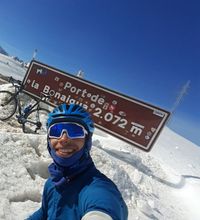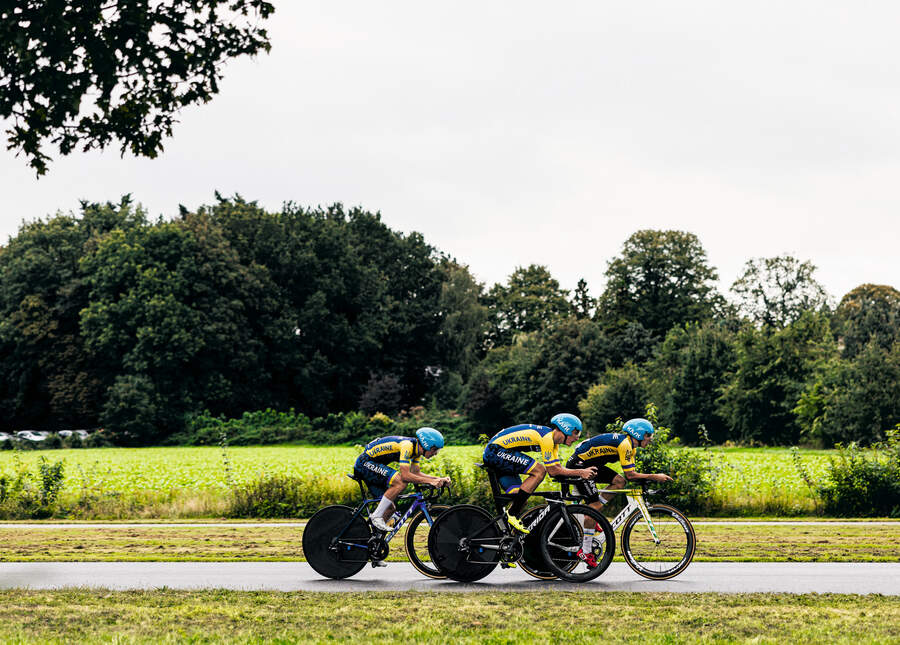How the Ukraine Cycling Academy are keeping the nation's cycling dream alive
Chris Marshall-Bell meets the cycling academy in Italy

The latest race content, interviews, features, reviews and expert buying guides, direct to your inbox!
You are now subscribed
Your newsletter sign-up was successful
Ukrainian cyclist Danylo Chernomortsev had just turned 16 when Russia began its full-scale invasion of his country in February 2022. His hometown, the southern city of Mykolaiv, was battered by the invading force’s artillery from day one. “A lot of Russian machines and tanks came to Mykolaiv, tried to surround the city and take it. We watched so many tanks go past our house,” he says.
Russia failed to seize Mykolaiv, but for the past two-and-a-bit years, the city has remained one of Vladimir Putin’s key targets. Ordinary people have paid the price – including one of Chernomortsev’s closest friends Petro Ivanov. “Seven months after the war, my friend, who was 16 like me, was coming back from school when a Russian missile killed him in the centre of the city. No one can replace him.”
Today, Chernomortsev is one of 16 young Ukrainian cyclists racing for the Ukraine Cycling Academy, based in Italy, continuing to pursue their sporting dreams in spite of their country’s uncertain future. But even though the aspiring racers are safe in their new surroundings of northern Italy, the scars of war remain. Yurii Shcherban, now 21, recalls spending the first two months of the invasion in an air-raid shelter in Ternopil, not far from Lviv, and not knowing for several weeks if his soldier father was alive or dead.
“We didn’t know what had happened to him; my mum was always saying she hoped he hadn’t gone to the frontline.” His dad returned safe and well – unlike the father of a close friend. “During the first days, my friend’s father was fatally wounded. I remember him being in the shelter with us, and even now it’s hard to realise that we’ll never see him again. It’s really hard psychologically.”
A Lombardy lifeline
Before the invasion, Ukraine had a thriving cycling scene: there was a multitude of UCI-categorised road and track events, a handful of third-tier men’s and women’s Continental teams, and dozens of riders competing across the globe for either domestic or foreign teams. Some, like Mark Padun, were winning WorldTour races. But when Russian tanks stormed across the border in late winter 2022, the pathways to becoming a professional cyclist narrowed in an instant.
The Ukrainian Ministry of Sport, its cycling federation and the UCI realised that they had to keep one avenue open, and thus poured money into the Eurocar Grawe Continental team that had been in existence since 2017 under various names. A rebrand to Ukraine Cycling Academy followed, as did a commitment to developing homegrown talent, and it was agreed that the team would assist juniors on an ad-hoc basis (as many as 70 in 2023), and a select number of U23 riders would be permanently based in Italy, riding a predominantly Italian calendar.
“Italy is not home for them, but it’s where they can live in peace and like cyclists,” says 32-year-old team manager and former pro Oleksi Kasianov. “Look at Belgium, Spain, Italy, and the number of teams they have. Ukraine only has this one. It’s very important that Ukraine remains talked about in cycling.”
The latest race content, interviews, features, reviews and expert buying guides, direct to your inbox!
The team is not only a symbol of defiance. Like the hundreds of other development teams around the world, this one exists to help young cyclists fulfil their aspirations, and the 16 riders, who all live in the same complex 10km from the city of Bergamo in Lombardy (see boxout), have hopes of emulating the five Ukrainian men and women who are current professional riders. “We’ve had some good results including winning some Italian regional races, and we want more,” says Kasianov, whose wife Hanna is the team’s principal sports director.

Separation and aspiration
Many Ukrainian cyclists begin on the track before crossing to the road, but the country’s riders have a long history of leaving home and moving elsewhere to chase their road ambitions. Such a leap of faith takes on greater signicance during wartime. In March 2022, lightweight climber Andrii Pidhainyi was just 16 as he left his family behind in their city of Zhytomyr, less than 200km from the Russian border, to move to Poland, before settling in Italy.
“It’s hard to be without my family and friends, but it’s dangerous in Ukraine,” he says. “I want to become a pro on a big team, ride with experienced guys, and to earn good money.” Pidhainyi slotted into the demands of Italian racing with aplomb last summer, finishing second in one stage of the Giro del Veneto and winning the King of the Mountain’s classification. “I was third on GC but got a flat tyre on the last stage, losing the chance to be on the podium, but it was still a great race.” Shcherban, his team-mate, is translating for him and says: “Andrii is one of our strongest riders – you only have to look at him to see he goes fast up mountains.”
Several riders temporarily returned to their homeland last June to race the national road championships in the west of the country, back after a year’s hiatus. Pidhainyi finished fourth, and Chernomortsev was second.
“After two months of the war, my coach called me and said, ‘Danylo, take your clothes, there is food, safety and a team in Switzerland for you’,” says Chernomortsev. “So I went, but I had to leave my mother behind, and it was only after two months my coach and I could bring her to Switzerland,” he says, the emotion of his words palpable even through the translator. “The Swiss Cycling federation gave me a Scott bike, clothes, food, and paid for me and two other friends to race – I was really grateful. Now I’m in Italy, in one of the motherlands of cycling. I want to write my name in history as a Tour de France stage winner, and give something back to those who have helped me.”
Carrying the torch
Ukraine once had a domestic cycling scene in which aspiring racers could hone their skills, but no longer. “Some races came back in 2023, like the national champs, but now the amateur races in Ukraine aren’t very popular,” Kasianov says. Shcherban, the reigning national champion in the elimination race, gives a fuller picture: “Ukrainian cycling is really damaged: a lot of riders left cycling to start work or to join the army, and there aren’t many elite, U23 or junior races. But it’s important to show the children that Ukrainian cycling continues to live.”
For Kasianov, tasked with guiding a group of teenagers and early-20- somethings traumatised by events back home, he gets up each day with the same motivation. “My dream is that in 2024 we will win more races so that social media, magazines, newspapers and the TV all talk about Ukraine. The Ukraine Cycling Academy is so important for the country and to these boys.”
The young cyclists housed together in northern Italy are focused on realising their cycling potential, but their minds rarely drift far from the frontlines where Russia has made signicant gains in recent months. “We all speak about the war and what’s happening because we can’t forget about it,” says Shcherban, an omnium specialist who is targeting July’s European Track Championships. “I have the air raid siren app on my phone that rings whenever we must go into a shelter, and it still goes off most days. The world can’t forget about my country, because if the Russians separate Ukraine, the rest of Europe will be next.”
A freelance sports journalist and podcaster, you'll mostly find Chris's byline attached to news scoops, profile interviews and long reads across a variety of different publications. He has been writing regularly for Cycling Weekly since 2013. In 2024 he released a seven-part podcast documentary, Ghost in the Machine, about motor doping in cycling.
Previously a ski, hiking and cycling guide in the Canadian Rockies and Spanish Pyrenees, he almost certainly holds the record for the most number of interviews conducted from snowy mountains. He lives in Valencia, Spain.
